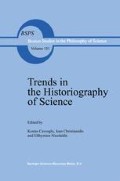Abstract
I grew up nursing an illusion: that science was a humanity. Maybe this deliberate naïveté explains how breathlessly I fell in with romantic science. But that is a story with many roots. In any case, it is not a story of retreat, nor an antiquarian withdrawal from the problems of the present world. My turn to romanticism has always born the mark of its original motivation: to goad my contrary commitments to literature and to science — the rivalries I have allowed to grow, even fostered, within me — into a dialogue, to force them to confront each other and to speak.
Access this chapter
Tax calculation will be finalised at checkout
Purchases are for personal use only
Preview
Unable to display preview. Download preview PDF.
Notes
Circumscribing Science: Johann Wilhelm Ritter and the Physics of Sidereal Man” (Ph. D. diss., Harvard University, 1992 ).
Epistolario di Alessandro Volta. Edizione Nazionale. Volume Quinto, 1805–1827 (Nicola Zanichelli Editore: Bologna, 1955), 110. All translations are my own.
Gilbert to Volta, 18 February 1803. Epistolario di Alessandro Volta. Edizione Nazionale. Volume Quarto, 1800–1805 ( Nicola Zanichelli Editore: Bologna, 1953 ), 258.
Johann Wilhelm Ritter, Beweis, daß ein beständiger Galvanismus den Lebensproceß in dem Thierreich begleite. Nebst neuen Versuchen und Bemerkungen über den Galvanismus (Weimar: Industrie-Comptoir, 1798). For alternative readings of Ritter’s Beweis, see Hinrich Knittermeyer, Schelling und die romantische Schule (Munich: Ernst Reinhardt, 1929), 142151; Barry Gower, “Speculation in Physics: The History and Practice of Naturphilosophie,” Studies in History and Philosophy of Science 3 (1973): 327–339; and Walter D. Wetzels, “Johann Wilhelm Ritter: Romantic Physics in Germany,” in Romanticism and the Sciences, ed. Andrew Cunningham and Nicholas Jardine ( Cambridge: Cambridge University Press, 1990 ), 201–203.
Luigi Galvani, De viribus electricitatis in motu musculari commentarius (Bologna, 1791 ). For a detailed examination of the reception of Galvani’s discovery among German-speaking researchers, see Maria Trumpler, “Questioning Nature: Experimental Investigations of Animal Electricity in Germany, 1791–1810” (Ph. D. diss., Yale University, 1992 ).
Beweis, 121.
Ritter, “Über den Galvanismus; einige Resultate aus den bisherigen Untersuchungen darüber, und als endliches: die Entdeckung eines in der ganzen lebenden und todten Natur sehr thätigen Princips; — vorgelesen in der Naturforschenden Gesellschaft zu Jena, am 29. October 1797,” in Physisch-Chemische Abhandlungen in chronologischer Folge ( Leipzig: C. H. Reclam, 1806 ).
Beweis, x.
See Brigitte Lohff, Die Suche nach der Wissenschaftlichkeit der Physiologie in der Zeit der Romantik ( Stuttgart and New York: Gustav Fischer, 1990 ).
Ritter to Ernst II., Herzog von Sachsen-Gotha, 14 June 1802, in Kurt Poppe, “Johann Wilhelm Ritter und Ernst II., Herzog von Sachsen-Gotha Etc. Zwei unbekannte Briefe aus den Jahren 1802–1803,” Jahrbuch des Freien Deutschen Hochstifts (1972): 183.
Beweis, 28 and 36.
Ibid., 25 ff.
Ibid., 61, 80, and 161.
Ibid., 34.
Ibid., 44.
Ibid., ix.
Darstellung der neuern Untersuchungen über das Leuchten des Phosphors im Stickstoffgas u.s. w. und der endlichen Resultate daraus für die chemischen Theorie (Jena: Frommann, 1800).
Ibid., iii.
Ibid., vi—vii.
Ibid., X.
Ibid., 13.
Beweis, 85–86.
James Paradis. “Montaigne, Boyle, and the Essay of Experience,” in One Culture. Essays in Science and Literature, ed. George levine ( Madison, WI: The University of Wisconsin Press, 1987 ), 76.
Beweis, 94.
Ibid., 105.
Ibid., xii.
Ibid., 174.
Ibid., viii.
Ibid.
Hans Christian Orsted, “Betrachtungen über die Geschichte der Chemie,” Journal für die Chemie und Physik 3 (1807): 209.
Beweis, vii.
Ritter, Die Physik als Kunst. Ein Versuch, die Tendenz der Physik aus ihrer Geschichte zu deuten ( Munich: Joseph Lindauer, 1806 ).
A. Baltas, “On the Harmful Effects of Excessive Anti-Whiggism,” Contemporary Trends in the Historiography of Science, Corfu, 27 May 1991.
Author information
Authors and Affiliations
Editor information
Editors and Affiliations
Rights and permissions
Copyright information
© 1994 Springer Science+Business Media Dordrecht
About this chapter
Cite this chapter
Strickland, S.W. (1994). Reopening the Texts of Romantic Science: The Language of Experience in J. W. Ritter’s Beweis . In: Gavroglu, K., Christianidis, J., Nicolaidis, E. (eds) Trends in the Historiography of Science. Boston Studies in the Philosophy of Science, vol 151. Springer, Dordrecht. https://doi.org/10.1007/978-94-017-3596-4_28
Download citation
DOI: https://doi.org/10.1007/978-94-017-3596-4_28
Publisher Name: Springer, Dordrecht
Print ISBN: 978-90-481-4264-4
Online ISBN: 978-94-017-3596-4
eBook Packages: Springer Book Archive

